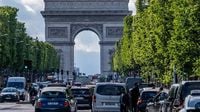On April 16, 2025, a bomb alert caused panic in the Galerie des Arcades on the Champs-Élysées in Paris. The incident occurred after an anonymous call around 16:45, reporting an explosive device in a café on the ground floor of the Galerie des Arcades. The authorities deployed a large security presence and evacuated the building. For nearly an hour, part of the Champs-Élysées was under high surveillance.
During this unsettling afternoon, Paris was bustling with its usual energy when the calm was shattered by a concerning phone call. The alert was raised about an explosive device allegedly located in a Starbucks café within the popular shopping center. In response, local authorities acted swiftly, mobilizing a significant security detail to ensure the safety of residents and visitors alike.
The evacuation was executed with precision, as staff and customers were instructed to leave the premises immediately. Social media was soon filled with images of confused bystanders, shop employees hastily exiting, and police cordons blocking access to the iconic avenue. The Champs-Élysées, a symbol of luxury and culture, transformed into a scene of heightened alert, raising concerns in a city already familiar with tension.
According to Jeanne d'Hauteserre, the mayor of the VIII arrondissement, the call sparked a comprehensive security operation. "An extensive security deployment was necessary to ensure public safety," she stated. The police worked diligently to search every corner of the building, while traffic on the Champs-Élysées was halted to facilitate their efforts. By around 17:30, the authorities lifted the alert, confirming that no explosives were found.
Witnesses recounted their experiences amid the chaos. "It was surreal. In just minutes, everyone was running, and we didn’t know if it was serious or not," said an anonymous witness at the scene. The incident left many shaken, highlighting the fragile nature of security in urban environments.
False bomb alerts, while not a new phenomenon, present an escalating challenge for authorities. In France, disseminating false information intended to incite panic is a serious offense. Under the Penal Code, such actions can lead to up to two years in prison and a fine of €30,000. Despite the lack of a real threat, the resources mobilized during these incidents are substantial, contributing to a climate of insecurity.
Earlier that same day, a similar evacuation had occurred at a major train station in Paris due to another bomb threat. These repeated incidents prompt critical questions: Why are these malicious calls becoming more frequent? Are they isolated acts or part of a coordinated effort to instill fear?
The impact of such events extends beyond immediate panic. For locals and tourists alike, the incident serves as a stark reminder of the potential dangers lurking in a vibrant city like Paris. The Champs-Élysées attracts millions of visitors annually, and a bomb threat, even if unfounded, can tarnish its reputation and undermine the confidence of those who come to enjoy its beauty.
Retailers in the Galerie des Arcades faced an abrupt halt to their business activities. "We had to close everything in a hurry. We didn’t know how long it would last," lamented an employee from one of the shops. The economic repercussions, even if temporary, are real for these establishments, which rely heavily on foot traffic.
Paris is no stranger to crises, having weathered terrorist attacks and civil unrest in recent years. This latest incident, while minor in comparison, underscores the ongoing vigilance of authorities in maintaining public safety. Operations to investigate such threats, although resource-intensive, are crucial for ensuring the well-being of citizens.
Yet, these false alarms reveal an uncomfortable truth: fear can be triggered by a single phone call. In a world marked by instability, even unfounded threats can evoke painful memories and test the nerves of citizens.
In response to the rise in false alerts, authorities are exploring various strategies. These include strengthening penalties to deter potential offenders, leveraging advanced technologies for call tracing, and raising public awareness about the consequences of such actions. However, these measures alone may not suffice. International cooperation is vital, as threats—real or imagined—can have cross-border ramifications.
Citizens are urged to remain vigilant yet not succumb to panic. The Champs-Élysées stands as more than just a street; it symbolizes the resilience of France. Each incident, whether real or fabricated, tests the spirit of this city of light. On April 16, 2025, Paris once again demonstrated its ability to confront fear, but at what cost?
As the city continues to shine, it must also learn to navigate a world where fear is a weapon in its own right. The events of this day are not merely a story to tell; they reflect the challenges of an era where even imaginary threats can paralyze a bustling metropolis.





